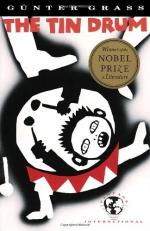|
|
The Tin Drum Chapter 36: Fortuna North
Oskar says only wealthy people got tombstones, and "wealth" was relative. Five sacks of potatoes got a plain head-marker. A tomb for two brought Oskar and Korneff material to make new suits. An apprentice of the supplier made the suits for them. Oskar got a single-breasted dark blue pinstriped suit. It took five fittings for the apprentice to figure out how to deal with Oskar's hump. Korneff's suit was double-breasted. From another man, Korneff bartered nice shoes. He gave Maria money to buy him dress shirts, letting her keep the ample change.
A week later, Oskar went to the hospital to visit the nurses, dressed in his new suit. Although she was reluctant, Oskar found and convinced Sister Gertrude to meet him in town that night, promising her that he had saved up plenty of cake rationing stamps. They met, but Oskar was disappointed; Sister Gertrude had neglected to wear her nurse's uniform. Oskar took her to a pastry shop where they ate cake; he had one piece and she had three. Oskar invited her dancing; she accepted enthusiastically, realizing too late that Oskar was too small to dance with. They went to a dance hall called The Lion's Den, where Oskar and Gertrude were seated - Oskar bought drinks and American cigarettes. When Oskar stamped out a half-smoked Camel, Gertrude picked it up and put it in her purse, saying it was for her fiancé. He asked her to dance; she let him lead reluctantly. Soon, the pair was the object of attention. When they sat down to applause, Gertrude blushed, said she had to go to the lady's room, and never came back. The young couples consoled him from the dance floor; he was asked to dance by a woman who turned out, along with her friend, to work at the telephone exchange. Oskar spent the evening in the dance hall with the women. He never saw Sister Gertrude again except at a distance. He became a regular at The Lion's Den, however, and made friends, though he never touched the drums.
In the winter his tombstone job changed; he had to take care of the equipment and get ready for the spring thaw. Oskar practiced his relief sculpture and shoveled snow, then began setting up stones in March at a cemetery near a coal power plant called Fortuna North. Three rows away, two men were exhuming a woman in order to move her. Oskar went over to watch; the men were transferring the pieces of the woman that came out one at a time into a zinc casket. Oskar had a spade, former property of the Reich Labor Service, and began to dig; in his spade he found both the woman's middle and a ring finger, which had been chopped off by the gravedigger. Looking at those fingers, the woman, half in and half out of the casket, became Hamlet. Oskar became Yorick, the fool.
"The fields were the fields of Denmark; the Erft was my belt, whatever rot lay around was rotten in the state of Denmark - and I was Yorick....looked on as Gründgens, Act III, scene I, labored his dilemma about being or not being, rejected this absurd formulation, and put the question more completely: 'My son and my son's lighter flints, my presumptive earthly and heavenly father, my grandmother's four skirts, the beauty, immortalized in photographs, of my poor mama, the maze of scars on Herbert Truczinski's back, the blood-absorbing mail baskets at the Polish Post Office, America - but what is America compared to Streetcar Number 9 that went to Brösen?" Chapter 36, pg. 460
Topic Tracking: Individuality/Identity 15
After this crisis, Oskar stopped going to The Lion's Den. In May he proposed to Maria, who declined him marriage but wished him the best. Oskar says Yorick did not become a good citizen, but a fool like Hamlet himself.




